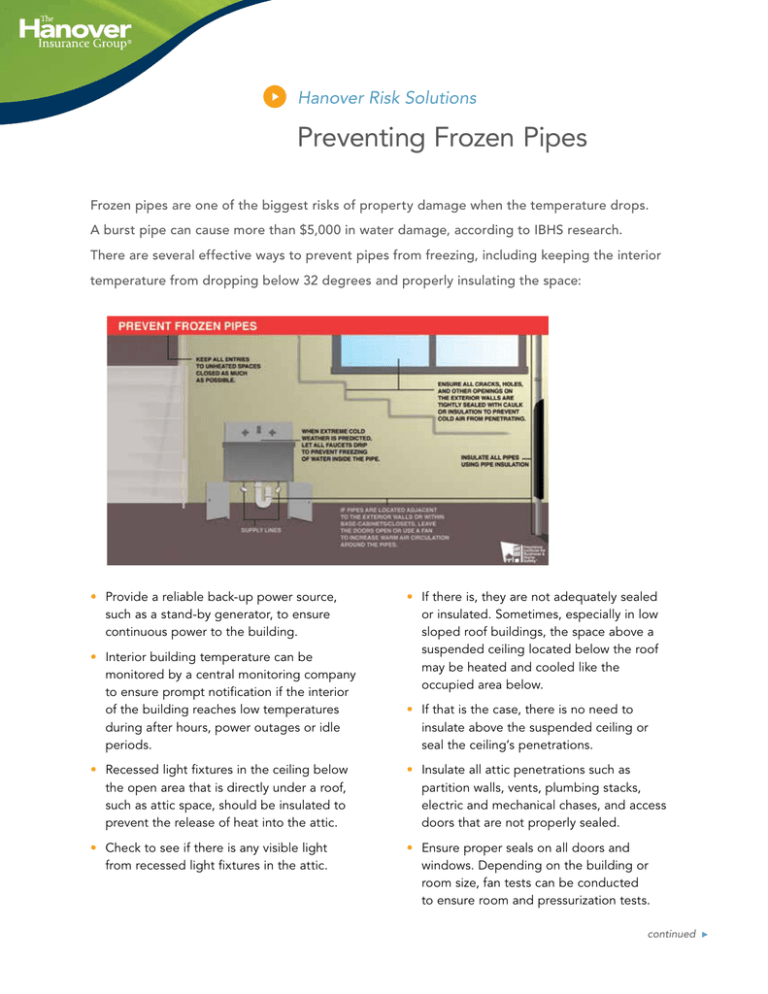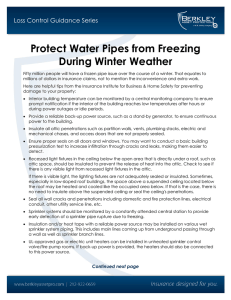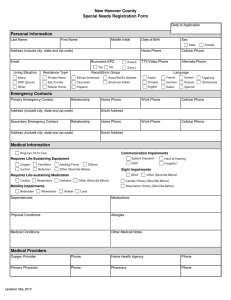
Hanover Risk Solutions
Preventing Frozen Pipes
Frozen pipes are one of the biggest risks of property damage when the temperature drops.
A burst pipe can cause more than $5,000 in water damage, according to IBHS research.
There are several effective ways to prevent pipes from freezing, including keeping the interior
temperature from dropping below 32 degrees and properly insulating the space:
• Provide a reliable back-up power source,
such as a stand-by generator, to ensure
continuous power to the building.
• Interior building temperature can be
monitored by a central monitoring company
to ensure prompt notification if the interior
of the building reaches low temperatures
during after hours, power outages or idle
periods.
• If there is, they are not adequately sealed
or insulated. Sometimes, especially in low
sloped roof buildings, the space above a
suspended ceiling located below the roof
may be heated and cooled like the
occupied area below.
• If that is the case, there is no need to
insulate above the suspended ceiling or
seal the ceiling’s penetrations.
• Recessed light fixtures in the ceiling below
the open area that is directly under a roof,
such as attic space, should be insulated to
prevent the release of heat into the attic.
• Insulate all attic penetrations such as
partition walls, vents, plumbing stacks,
electric and mechanical chases, and access
doors that are not properly sealed.
• Check to see if there is any visible light
from recessed light fixtures in the attic.
• Ensure proper seals on all doors and
windows. Depending on the building or
room size, fan tests can be conducted
to ensure room and pressurization tests.
continued
S EAGNM
H
OV
EN
ETR BRA
I SNKDS O LU T I O N S
• Seal all wall cracks and penetrations
including domestic and fire protection
lines, electrical conduit, other utility
service line, etc.
• Sprinkler systems should be monitored
by a constantly attended central station to
provide early detection of a sprinkler pipe
rupture due to freezing.
• Insulation and/or heat trace tape with a
reliable power source may be installed
on various wet sprinkler system piping.
This includes main lines coming up from
underground passing through a wall as
well as sprinkler branch lines.
• UL-approved gas or electric unit heaters can
be installed in unheated sprinkler control
valve/fire pump rooms. If back-up power
is provided, the heaters should also be
connected to this power source.
• A monitored automatic excess flow switch
can be placed on the main incoming
domestic water line to provide early
detection of a broken pipe or valve
when the space is unoccupied.
Why The Hanover?
The Hanover is a leading property and casualty insurance company dedicated to achieving world-class performance.
Our commitment is to deliver the products, services, and technology offered by the best national companies with the
responsiveness, market focus, and local decision making of the best regional companies. This powerful combination
has been a proven success since our founding in 1852, and all insurance company subsidiaries are rated “A” (Excellent)
by A. M. Best Company.
The Hanover Insurance Company
440 Lincoln Street, Worcester, MA 01653
hanover.com
The Agency Place (TAP) — https://tap.hanover.com
© 2012 Insurance Institute for Business & Home Safety
The recommendation(s), advice and contents of this material are provided for informational purposes only and do not purport to address every possible legal obligation, hazard,
code violation, loss potential or exception to good practice. The Hanover Insurance Company and its affiliates and subsidiaries (“The Hanover”) specifically disclaim any warranty or
representation that acceptance of any recommendations or advice contained herein will make any premises, property or operation safe or in compliance with any law or regulation.
Under no circumstances should this material or your acceptance of any recommendations or advice contained herein be construed as establishing the existence or availability of any
insurance coverage with The Hanover. By providing this information to you, The Hanover does not assume (and specifically disclaims) any duty, undertaking or responsibility to you.
The decision to accept or implement any recommendation(s) or advice contained in this material must be made by you.
©2014 The Hanover Insurance Group, Inc. All Rights Reserved.
171-1137 (9/14)
LC 2014-348


